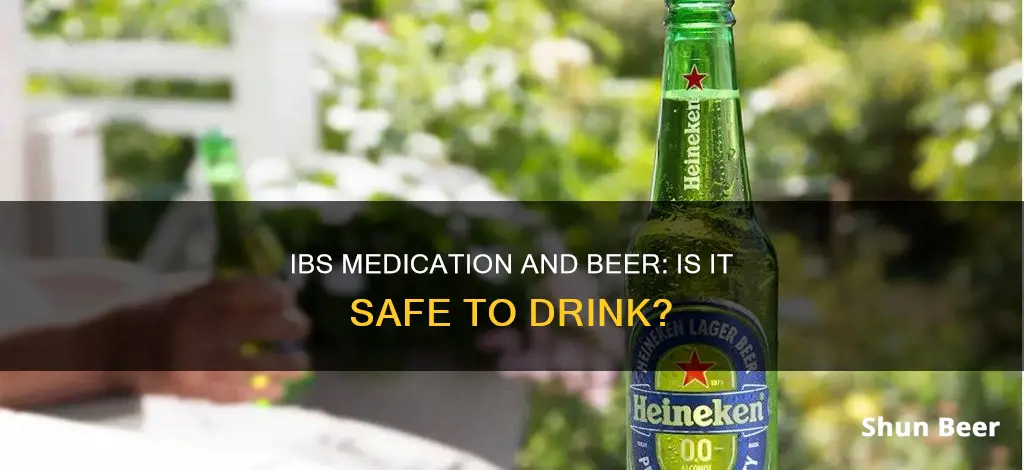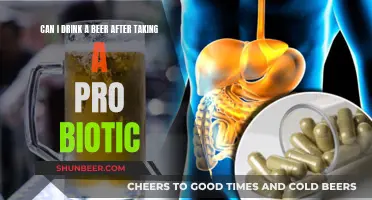
Alcohol is a known gut irritant and can affect intestinal motility, intestinal absorption, and permeability. It is a common trigger for individuals with IBS, causing pain, bloating, urgency, and diarrhoea. The effects of alcohol on IBS vary from person to person, and while some people with IBS have to eliminate alcohol completely, others can still enjoy an occasional drink.
If you have IBS, it is important to understand how your body reacts to alcohol so you can manage how much you drink.
| Characteristics | Values |
|---|---|
| Alcohol's effect on IBS | Alcohol is a gut irritant and can affect intestinal motility, intestinal absorption, and permeability. Alcohol can cause adverse effects on the health of the gut and be detrimental to people with IBS. |
| Alcohol's effect on the body | Alcohol reduces the absorption of nutrients in the gut. It can also speed up motility (the speed in which matter moves through the digestive tract), increasing the risk of diarrhea. Alcohol can also cause acid reflux by weakening the esophageal sphincter. |
| Alcohol and IBS triggers | There is no clear answer as to whether alcohol should be a no-go for those with IBS. Each person's sensitivity to alcohol may vary. |
| Tips for drinking with IBS | Drink water between alcoholic beverages, eat food when drinking, choose low FODMAP alcoholic beverages, and limit consumption. |
What You'll Learn

Alcohol is a gut irritant
Alcohol is a known toxin and has many effects on the digestive tract. It can irritate the gastrointestinal (GI) system and may worsen your gut symptoms. Alcohol affects different GI organs in different ways.
- Mouth: Alcohol abuse is the second-largest risk factor behind cigarette smoking for oral cancer.
- Esophagus: Alcohol consumption is a major risk factor for esophageal cancer, especially esophageal squamous cell carcinoma.
- Stomach: Alcohol can promote inflammation in the stomach lining, causing gastritis.
- Small intestine: Alcohol reduces the absorption of nutrients in the gut, which can cause IBS symptoms when these substances interact with bacteria in the gut. Alcohol can also speed up motility (the speed at which matter moves through the digestive tract), increasing the risk of diarrhea.
- The esophageal sphincter: Alcohol can weaken the esophageal sphincter, triggering acid reflux.
- Stomach: Alcohol can increase acid secretion in the stomach and slow down stomach emptying, causing nausea and vomiting.
Alcohol can also cause inflammation in the liver, as it is broken down into the toxic enzyme acetaldehyde. Chronic inflammation in the liver from alcohol abuse can lead to health problems such as alcoholic fatty liver disease, liver cancer, or cirrhosis.
Charleston Beer Works: Closest Hotels for a Quick Pint
You may want to see also

Alcohol's impact on people with IBS varies
Alcohol is a gut irritant and can affect intestinal motility, intestinal absorption, and permeability. It can irritate and cause inflammation in the gut, and stimulate the digestive tract, which may cause diarrhea. It has also been shown to reduce the absorption of nutrients in the gut, which can cause IBS symptoms when these substances interact with bacteria in the gut. Alcohol can also speed up motility, increasing the risk of diarrhea.
However, the research on the relationship between alcohol consumption and IBS is rare and has yielded mixed results. While some studies show that alcohol causes bacterial overgrowth and leaky gut, other experts suggest that light to moderate drinking may not cause adverse effects.
If you have IBS and want to drink alcohol, it is recommended that you monitor your reactions to alcohol and how it affects your symptoms. You can also try to avoid alcohol with high FODMAPs and be careful not to add juice or fizzy mixers to your drinks. Drinking water in between alcoholic drinks may also help.
Crafting Beer: My Career in Brewing
You may want to see also

Beer is a common trigger for IBS
Alcohol is a Gut Irritant
Alcohol is a gut irritant and can affect intestinal motility, intestinal absorption, and permeability. It can irritate and cause inflammation in the gut, leading to a flare-up of IBS symptoms such as cramping, bloating, gas, and diarrhoea. Even one alcoholic beverage can be enough to trigger a flare-up, depending on the person's sensitivity.
FODMAPs and IBS
FODMAPs (fermentable oligosaccharides, disaccharides, monosaccharides, and polyols) are found in many alcoholic beverages and can trigger IBS symptoms such as bloating, pain, and gas. Beer, for example, is low in FODMAPs but contains a small amount of gluten, which may be enough to trigger a reaction in people with coeliac disease.
Alcohol's Effect on the Digestive System
Alcohol can affect the digestive system in several ways, including:
- Weakening the oesophageal sphincter, leading to acid reflux
- Increasing acid secretion in the stomach and slowing down stomach emptying, causing irritation and nausea
- Reducing nutrient absorption in the small intestine, leading to problems with gas and diarrhoea
- Speeding up peristalsis, increasing the risk, severity, and frequency of diarrhoea
Managing IBS Symptoms when Drinking
If you choose to drink alcohol, there are some tips that may help reduce gut upset:
- Choose low FODMAP alcoholic beverages, such as vodka or gin with soda water, and try to limit your intake to two drinks per day.
- Drink a glass of water between each alcoholic beverage to stay hydrated and dilute the alcohol.
- Eat low FODMAP foods to reduce the overall FODMAP load.
- Get a good night's sleep.
- Always drink responsibly, stay hydrated, and eat before and during alcohol consumption.
Amtrak's Beer Policy: Can You Drink While Riding?
You may want to see also

Low FODMAP alternatives to beer
If you're looking for low-FODMAP alternatives to beer, there are a few options you can consider. Here are some suggestions:
- Wine: Most wines, including red, white, rosé, and sparkling, are low FODMAP when consumed in moderation (typically around 150ml or one glass). However, avoid fortified wines like sherry and port, as they tend to have high fructose levels.
- Spirits: Several spirits are low FODMAP, such as gin, vodka, whiskey, and brandy. Just be wary of sweetened spirits, as they may contain high FODMAP ingredients like high-fructose corn syrup or honey.
- Hard Seltzers: Hard seltzers are typically made by fermenting cane sugar and are often flavoured with natural flavours. While not all brands may be low FODMAP, some popular options include Omission and Bon & Viv.
- Cocktails: If you enjoy mixed drinks, opt for low FODMAP mixers like cranberry juice (in small servings), diet ginger ale, or tonic water. Avoid mixers with fruit juices or carbonated soft drinks, as they often contain high FODMAP sweeteners.
- Gluten-free Beer: If you're sensitive to gluten, you may want to explore gluten-free beer options. These beers are made with gluten-free grains and can be a good alternative for those with Celiac disease or gluten intolerance.
- Non-alcoholic Beer: While not officially tested for FODMAPs, non-alcoholic beer has a similar manufacturing process to regular beer. You can test your tolerance to it and see if your symptoms improve.
Remember, even if you choose a low FODMAP drink, alcohol can still be an IBS trigger for sensitive individuals. It's always a good idea to monitor your body's response and adjust your consumption accordingly.
Shotgunning Beer: How to Chug Instantly
You may want to see also

Tips for drinking with IBS
Drinking alcohol can be a complex issue for people with irritable bowel syndrome (IBS). Alcohol is known to irritate the gut, which can lead to a flare-up of IBS symptoms. However, while some people with IBS need to eliminate alcohol completely, others can still enjoy an occasional drink. The key is understanding your body and your triggers, and drinking in moderation if you choose to drink. Here are some tips for drinking with IBS:
Monitor your body's reaction to alcohol: Keep track of what you eat and drink, and how your body reacts, to understand your triggers. If you're unsure if alcohol is a trigger for you, try eliminating it completely and then reintroducing it to see if your symptoms worsen.
Choose your drinks wisely: Opt for low FODMAP alcoholic beverages, such as vodka, gin, red or white wine, sparkling wine, and gluten-free beer. Avoid carbonated and high-fructose beverages, which can cause bloating and pain.
Limit your consumption: Stick to a maximum of two drinks per day for men and one drink per day for women, as per US guidelines.
Slow down your consumption: Drinking slowly gives your digestive system more time to process the alcohol, potentially reducing IBS symptoms.
Drink water between alcoholic drinks: Drinking water can help dilute the alcohol and reduce its impact on your IBS symptoms.
Eat food when drinking: Having food in your stomach may help protect the lining of your gut from irritation. Eat a meal before or with your drink, and stick to low FODMAP foods if possible.
Choose your mixers carefully: Many fruit juices and sodas are high in FODMAPs and can trigger IBS symptoms. Opt for low FODMAP mixers like cranberry juice, club soda, small amounts of citrus juice, or unsweetened iced tea.
Watch your symptoms: If your IBS symptoms worsen after drinking, consider eliminating alcohol from your diet.
Beer Drop: How Does the Subscription Work?
You may want to see also
Frequently asked questions
Beer is a common trigger for IBS symptoms, including pain, bloating, urgency, and diarrhoea. However, some people with IBS can tolerate beer better than others. It's important to understand how your body reacts to alcohol and beer specifically to determine if you can drink it.
Beer contains carbonation, which can add gas and air to the digestive system, leading to gut spasms and abdominal swelling. Beer also contains gluten, which can trigger a reaction in people with celiac disease.
Yes, some low FODMAP alternatives to beer include red wine, dry white wine, sparkling wine/champagne, vodka, gin, tequila, and whiskey. However, even these low FODMAP drinks may still trigger symptoms due to alcohol being a gut irritant.
If you choose to drink beer, here are some tips to reduce gut upset: choose gluten-free beer, drink a glass of water between each beer, eat low FODMAP foods, and get a good night's sleep.
It's important to listen to your body and understand your triggers. You can try eliminating alcohol completely and then reintroducing it to see if it triggers your IBS symptoms. If you choose to drink, it's recommended to drink in moderation, stay hydrated, and eat before and during alcohol consumption.







